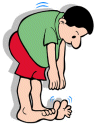 Do you workout hard? Is “no pain, no gain” your exercise ethos? Do you feel like you are not getting the fitness results you expect? Your brain could be to blame.
Do you workout hard? Is “no pain, no gain” your exercise ethos? Do you feel like you are not getting the fitness results you expect? Your brain could be to blame.
Yagesh Bhambhani and Rohit Malik of the Faculty of Rehabilitation Medicine, at the University of Alberta, Edmonton, Canada and Swapan Mookerjee of Bloomsburg University, Bloomsburg, Pennsylvania, USA, have monitored the oxygen levels of blood flowing in the brains of healthy volunteers while they worked out using near infrared spectroscopy.
NIRS can evaluate changes in blood volume and oxygen levels in the brain while people exercise by measuring the absorption of this form of electromagnetic radiation by the blood, which varies depending on how much oxygen is present.
The team has found that even if you are healthy, there could be an upper limit on just how hard you can push yourself, because brain activity begins to be affected detrimentally as you push harder and harder.
The study watched blood flow and volume as well as measuring carbon dioxide breathed out during an incremental exercise test. In the tests, exercise intensity is gradually stepped up until the volunteers reach exhaustion and must stop. The observed fall off in carbon dioxide levels coincided with decreased blood flow to the brain, which affects exercise capacity, the researchers say.
You can find out more about the science behind the exercise threshold here. Of course, if you are not pushing your exercise regime to the limits, then you probably have nothing to worry about. More to the point, the research is aimed at fine tuning finely tuned athletes and others, not providing the sedantary or mediocre with an excuse to give up half way through their treadmill cycle. (Ahem, mentioning no names…)